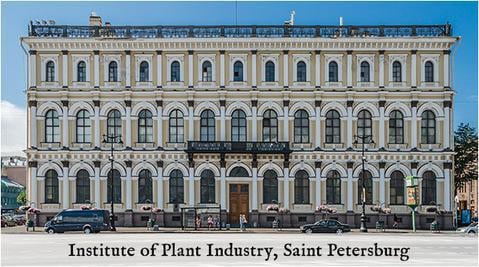As we pause from time to time to honor the memory of those patriots who gave the ultimate sacrifice for our country, I thought it would be fitting to share a lesson from the pages of history.
This inspiring true story comes from the WWII era. It teaches us about personal sacrifice - and the virtues required to make a difference in spite of great adversity.
Not only is this a fascinating tale, but we can carry its wisdom along with us in our preparedness journey.
SAVE THE SEEDS, FEED THE WORLD
 Let me tell you about the men and women who starved in order to save the world's seeds.
Let me tell you about the men and women who starved in order to save the world's seeds.
It was September 1941 - just a few months before the U.S. would be drawn into WWII after the attack on Pearl Harbor.
With Nazi troops laying siege to the city, no one and nothing could get in or out - including food.
This is the situation the citizens of Leningrad - now St. Petersburg - faced. The Siege of Leningrad lasted for 872 days, and in the end, more than a million lives were lost.
There are many heroic stories from this time in history, but the story I want to focus on involves some unlikely heroes.
The heroes in this story were actually scientists.
You see, when the Nazis started pouring into Leningrad, about 30 scientists and staffers from the Institute of Plant Industry scrambled to protect and barricade their massive collection of seeds.
The mission of the Institute of Plant Industry was to collect and save seeds from around the world in order to solve problems like famine, drought and more.
Under the leadership of Nikolai Vavilov, the team collected over 220,000 seeds. Vavilov's collecting expeditions even brought him to the U.S., where he met with many farmers and botanists to learn about crops in America.

Unfortunately for Vavilov, he was the victim of the ugliness of politics. Under Stalin, Soviet Russia experienced horrible famines. Looking for someone to blame, Stalin chose Vavilov as a scapegoat. He would die alone in a prison camp, alienated from his family, his life's work, and the crew that fought to preserve it.
But back in Leningrad, the scientists at the Institute guarded over Vavilov's seed collection for more than two years. Surrounded by food - or at least potential food - but with nothing to eat, most of the scientists starved to death during the siege.
These scientists weren't protecting the seeds from just the Nazis. They were also guarding them from the starving mobs of Leningrad - their fellow citizens.
Still, each of the scientists was steadfast in their mission to preserve the seeds. The curator of the rice collection supposedly died surrounded by bags of rice.
What enabled them to endure so much suffering, despite an easy way out?
They had a higher purpose.
The mission of the Institute of Plant Industry was to eliminate hunger; to help rebuild society after the darkness of war had cleared. The goal was that one day, future generations could enjoy the literal fruits of their sacrifice.

When you have a higher purpose like that, you'll do anything. Like frantically scooping up sprouting potatoes from a field being shelled with heavy artillery fire.
The selfless, heroic actions of those scientists had a big effect on Russian life today. A majority of the blackcurrants grown in Russia - the world's largest producer - were curated by Vavilov's crew of scientists. This crop now generates more than $400 million in farm sales every year.
A higher purpose.
It's something I believe strongly in - and believe that it's absolutely essential to the preparedness mindset.
A lot of folks think that "preppers" secretly hope for chaos and disaster.
This stereotype couldn't be further from the truth. Especially when you ask us about higher purpose. We all might have different definitions of that purpose - but we all envision positive outcomes, not doomsday scenarios.
In fact, many of us aren't that different from those Soviet scientists. Many of us save seeds - and protect them like our lives depend on it.
Why? Well, because we want the ability to rebuild society should we need to. It's no small task, and definitely not one anyone looks forward to doing.
However, should the need arise, we will rise to our higher purpose.
If you haven't actually thought about your own higher purpose in your preparedness journey, I invite you to ponder it.
It doesn't cost a thing, but it could be the most valuable step you take today.
Write it out. Set it in stone. Then be prepared to stake your life on it.
More than anything else, this higher purpose will keep you on the right path to preparedness and self-reliance. It can help you identify gaps and weaknesses in your preparedness plan. And it can help you make tough ethical decisions in a crisis. There are numerous benefits like these that come with having a higher purpose.
Keep the memory of those Russian scientists in mind. They staked their lives on a higher purpose for the good of humanity.
Just think what a higher purpose can do for you in your journey.
We can't help you define your higher purpose, but we can help with almost everything else.
Our preparedness experts are standing by at 866-229-0927.
In Liberty,
Grant Miller
Preparedness Advisor, My Patriot Supply


